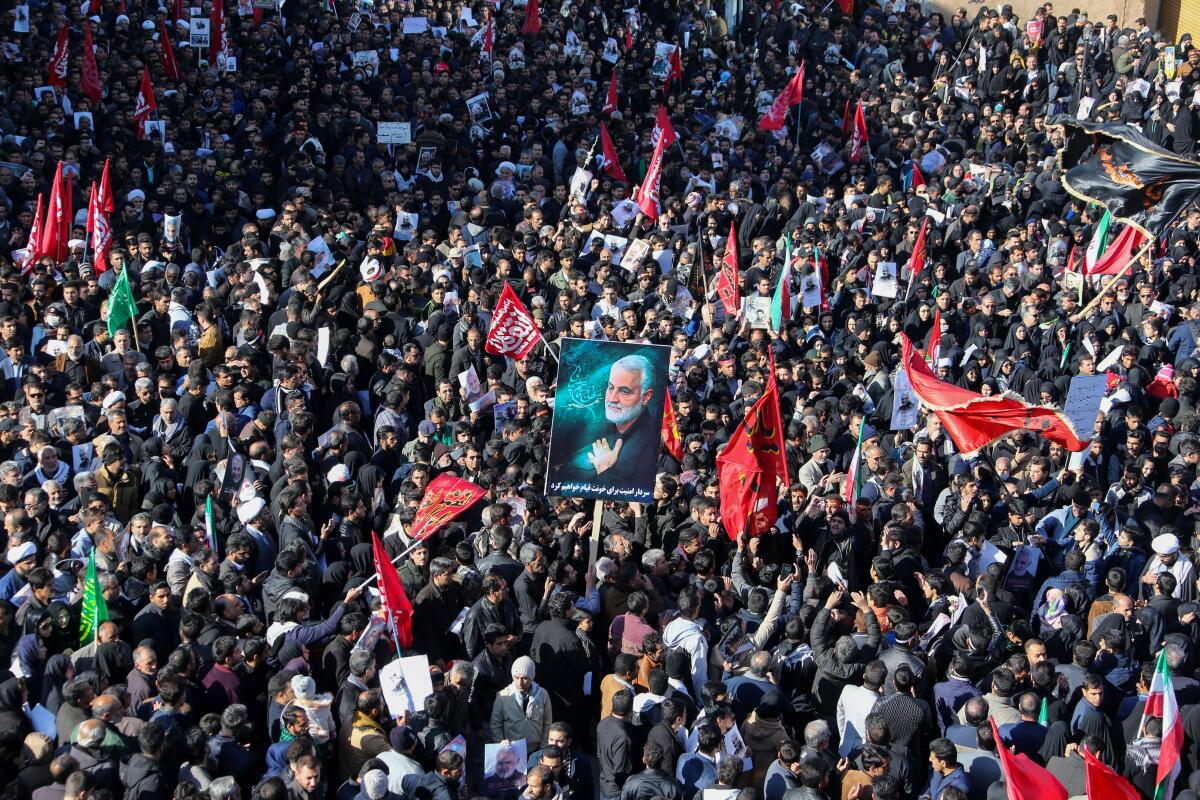Opinion: We’re on the brink of another calamitous war

- Share via
How did this current crisis all begin? A little history would help.
For the United States and Iran, the seminal date was 1953. That was when the desire to dominate Iran’s oil resources and its vital strategic position led the U.S. and Britain to overthrow an elected, democratic government. All the sordid details of this neo-colonial act of arrogance are laid out in public U.S. government documents, but they are absent from the false American narrative that it has been the champion of democracy in most of the Middle East.
Iranians have not forgotten any of this. They came to resent bitterly the dictatorship — fully backed by the American government — that was foisted on them in 1953 and lasted for the next 26 years. They already had harsh memories of previous interventions in their country by Czarist Russia, Britain and the USSR. They saw the U.S. as motivated by the same geo-strategic considerations, lust for oil, and contempt for the wishes of the Iranian people that drove these empires.
The Iranian Islamic revolutionary regime, which since the end of the Cold War has been one of the prime foes of the United States in the region, is heir to these memories and this bitterness. Failure to understand and deal with these real drivers of Iran’s behavior is the core of the problem in Washington, where a mind-set that ignores cultural and historical knowledge dominates the views of most of our politicians.
Attacks against the United States by Iran and its allies — the 444-day seizure of the American Embassy starting in 1979, the truck bombing of the Marine barracks in Beirut in 1983, multiple kidnappings and assassinations, and many more — are rooted in this history. They are rooted as well in two other crucial American policy decisions that amounted to indirect acts of war: massive support for Saddam Hussein’s devastating war with Iran from 1980 to 1988, and for Israel’s invasion of Lebanon in 1982.
Iran’s Islamic Revolutionary Guard Corps would not exist without Iraq’s war on Iran, which was supported by the U.S., the USSR and European powers and led to the deaths of at least half a million people. Hezbollah would not exist but for Israel’s U.S.-supported invasion and 18-year occupation of much of Lebanon.
Iran and its allies have indeed killed many Americans, and have inflicted much suffering on others. But this was part of a four-decade low-intensity war that the United States and its allies were full parties to. This war has flared in many places: in Lebanon, where in 1983-84 U.S. forces fought alongside Israel; in Iraq, where at least a million people died and millions were displaced both as a result of the U.S.-led invasion in 2003 and its disastrous aftermath; and in the Syrian civil war, where Russia, Iran and the U.S. and its allies have all been involved in the death and displacement of millions.
It should be a warning sign that only Israel has strongly supported the assassination of Gen. Qassem Suleimani, the second most important figure in the Iranian government. The Trump administration has now followed the Obama administration in adopting as its template Israel’s “targeted assassination” policy. Whatever excuses President Trump and Secretary of State Michael R. Pompeo manufacture, this was an act of war against a sovereign state and a violation of both international law and the U.S. Constitution. This course of lawlessness and arrogance assumes that permanent war on anyone who opposes U.S.-Israeli hegemony in the Middle East should be our way of life.
History can only tell us about mistakes made in the past, about the illusions that motivated policymakers, and the ideologies and ideals that drove peoples and governments. It cannot tell us what will happen. We do not need history to tell us that by withdrawing from the nuclear agreement with Iran and strangling its economy with sanctions, and now with this latest act of folly, the Trump administration has brought the United States to the brink of a third unnecessary war in the extended Middle East.
We already know the lessons of the Afghan and Iraqi wars. The current drive to war is motivated by the same blindness to history and to possible consequences that brought us Iraq and Afghanistan. For the politicians, their advisors and funders, there are no penalties for their recklessness. Indeed, there may be electoral and financial rewards, while innocent peoples far away, not to speak of American servicemen and -women, will pay the price.
Trump and his enablers must be stopped from pushing the world into the 21st century’s third calamitous war in that region. Anyone with any sense can foretell that this one has the potential to be far worse than, and just as unwinnable as, the two that preceded it.
Rashid Khalidi is author of “The Hundred Years War on Palestine” and the Edward Said professor of Modern Arab Studies at Columbia University.
More to Read
A cure for the common opinion
Get thought-provoking perspectives with our weekly newsletter.
You may occasionally receive promotional content from the Los Angeles Times.










